|
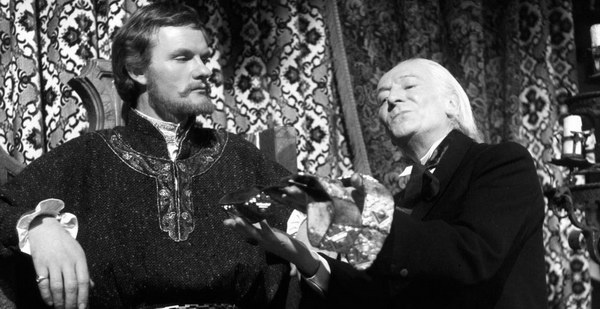
The Crusade
27TH MARCH 1965 - 17TH APRIL
1965
(4 EPISODES)
1. THE LION
2. THE KNIGHT OF JAFFA
3.
THE WHEEL OF FORTUNE 4. THE WARLORDS



The Crusade
is not one of my favourite first Doctor serials. The fact that
half
of its episodes are missing from the BBC archives does it no favours, but
my main problem with David Whitaker’s historical tale is that it is little
more than a series of very unfortunate events. Granted, The Crusade
is a series of well-written and well-acted unfortunate events, but as is
the case with many Hartnell historicals, there is nothing more to the plot
than the Doctor and his companions trying to escape in one piece.
Comparing this story to a serial such as The Aztecs, for example,
really highlights its shortcomings. Whilst John Lucarotti’s tale was also
based around the premise of the Doctor and his companions trying to get
back to the TARDIS alive, it was a much more intriguing story as in doing
so it explored Barbara actively trying to change history – something that
by this point in her travels, she knows she cannot do.
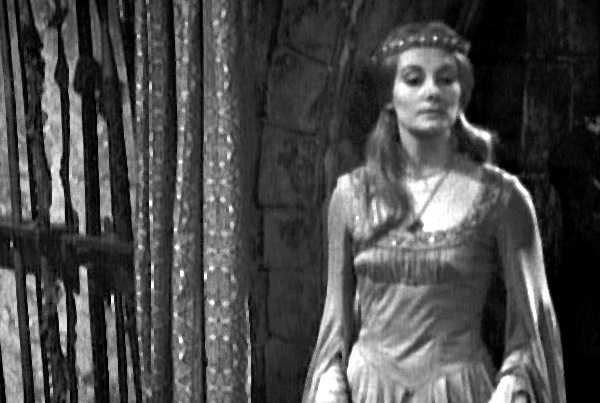
That said, the production standards of The Crusade are markedly
higher than in any of the earlier Hartnell historicals. There is not a
cloth background in sight, the costumes and make-up jobs are superlative
and even the scenes set in the desert and the woods are very convincing
for a 1965 studio-bound television show.
Moreover, The Crusade must be watched if only for Julian Glover’s
gleaming portrayal of Lionheart. Glover manages to imbue the legendary
crusader with a surprisingly sympathetic side, depicting him as a tortured
soul who always does what he believes to be right. Even when we, the
audience, disagree with what the King is doing – be it waging war on a
foreign land or aggressively arranging his sister’s marriage – thanks to
Glover’s powerful portrayal, we can still identify with the King’s point
of view.
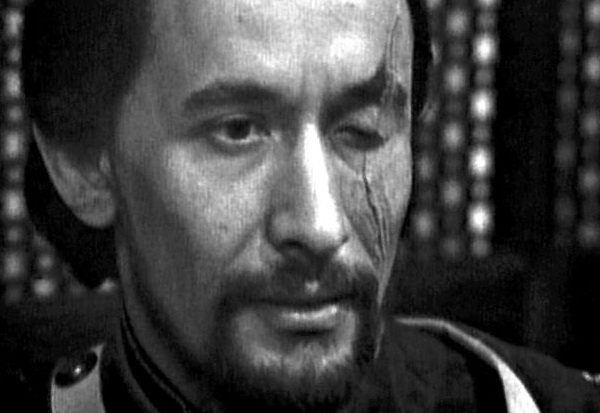
“The only pleasure left for you is death. And death is very
far away…”
Jean Marsh (the former Mrs Pertwee, who would return to the show as Sara
Kingdom a year later, and then again much later in 1989’s Battlefield)
also gives a spirited performance as Richard’s sister, Joanna, and I would
be doing Walter Randall a great injustice if I didn’t mention his
absolutely malevolent El Akir – possibly the most evil human character
ever to appear in Doctor Who. His scarred face masks an even more
hideous interior and, in spite of Doctor Who’s family audience, the
implications of his deplorable actions (kidnapping, rape etc) lend his
character a very real, very nasty side that most Who villains lack.
Watching
“The Lion”
and
“The Wheel of Fortune”
on DVD together
with reconstructions of
“The Knight of Jaffa”
and
“The War-Lords”,
I think I’ve managed to get a good feel for this story, but its negative
elements do seem to outweigh its positive ones. It’s just too discouraging
to watch Barbara be taken prisoner, escape, be hunted down, and then
become embroiled in the affairs of the Haroun family that El Akir has
destroyed. The Doctor’s cringeworthy feud with the Earl of Leicester is
painful to watch, and how on Earth Maureen O’Brien’s Vicki can be expected
to credibly pass for a lad is beyond me. In fact, of the TARDIS crew I
think that Ian is the only character to enjoy a decent outing here – he
ends up not only saving the day, but being knighted.
|
|
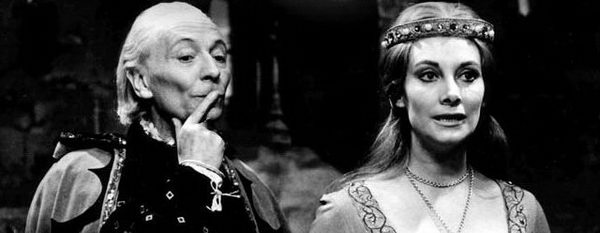
Doctor Who
and the
Crusaders



Of the three
original Doctor Who novelisations from the pre-Target era released
by BBC Audio, it is Doctor Who and the Crusaders that sees narrator
William Russell give his best reading. It comes as little surprise then,
upon hearing the interview at the end of the
final disc, that
this is his favourite story of the three. It’s no secret that historical
stories were more in the actors comfort zone than the science fiction
types such as The Daleks and The Web Planet, and he clearly
relishes getting his teeth into the material on offer here.
The original
serial The Crusade isn’t my favourite of the old Hartnell stories
by a long chalk. This is perhaps
less a judgment on the quality of the serial than it is the fact that half
of it has been lost. Trying to enjoy the story from what’s left gives one
a terribly disjointed feel; here, however, the story is presented as a
whole, and arguably in a format that it’s more suited to. Writer David
Whitaker elaborates his story without really altering it; the events are
much the same, but the world of their background is greatly expanded. His
rich prose and Russell’s spirited reading complement each other well.
.jpg)
Doctor Who
and the Crusaders provides a variety of characters
and incident.
Each of the many characters is presented as a well-rounded
character, and Russell provides subtly different voices for each, making it
easy to keep track of the who, how and why. The story can mostly
be broken into three strands. One concerns Vicki and the Doctor,
in the court of King Richard, doing their best not to become embroiled
in the twists and turns of the local politics and intrigue. This
is all interesting enough, particularly the disturbing fate of the
Princess Joanna, Richard’s sister – with hints of, let’s say, over
familiarity with her brother, and the threat of being used as a diplomatic
peace offering to the Saracen leader, Saladin. Russell’s take
on the Doctor and Vicki are better than on previous occasions,
probably as much due to better writing. However, it’s clear that the
author’s primary interest is not with these characters, and this
plotline wanes as the story moves on, to focus more on Ian and
Barbara’s ordeals amongst the Islamic settlements.
.jpg)
Barbara’s strand
is the most harrowing. In fact, I’d go as far to say that it is too much for younger readers. On television, the threat to Barbara is
never as overt as it is here. Though it is rarely graphic – save for a
miserable scene in which the villainous Emir el Akir has her whipped – the
constant threat of torture and humiliation is very strong. Although
younger readers may miss the inference, it is very clear that the female
slaves in el Akir’s palace are sexual slaves, something that I can’t
imagine finding its way in to many children’s adventure books. El Akir
is a particularly evil bastard by all accounts,
a man who delights in devising and performing torments for his
victims. He is potentially the most hideous and cruel individual
to ever appear in the series. However, Whitaker does use the
constant threat and fear to illustrate just how strong an individual
Barbara is.
Ian’s story is
that of his quest to rescue Barbara, offering both trial and
tribulations. Whilst he is knighted by King Richard and granted free movement by
Saladin, he suffers many injuries and tortures along the way.
Nonetheless, he never relents in his mission to find and rescue
Barbara. Russell’s acting career was taken up mostly by swashbuckling
characters, and he seems right at home with this aspect of Ian’s
character. Interestingly, the implied relationship between Ian and Barbara is painted far more
vividly here than it was on television. Romance between the
two was only ever lightly hinted at on the telly; here, however, they are definitely lovers.
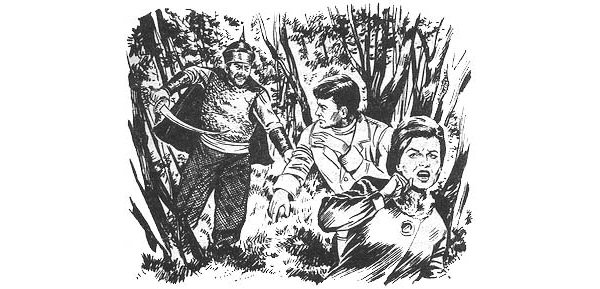
What deserves
respect here is Whitaker’s balanced portrayal of the Saracen race. It’s hard to imagine any family show in this day and age exploring the
historical relationship between Christian and Muslim states. It would have
been easy for this tale to descend into a generic adventure featuring
swarthy, villainous Mohammedans with shifty countenances. But while
there are villainous Arabs here – notably the aforementioned el Akir –
there.jpg) are also many more noble individuals. The ruler Saladin is a political
animal,
much
more suited to the role than his opposite number, King Richard. Haroun, an intensely affecting character whose wife and son were
slaughtered by el Akir, and his daughter stolen away, is a good, kind man
whose life has been destroyed, but who still stands by his
remaining daughter through everything, and even offers to help Barbara at great
risk to himself. Even Ibrahim, a
licentious thief who threatens Ian with
horrific torture, is presented as
an essentially decent man driven to extreme actions by his
poverty – in fact, he becomes one of the most entertaining
characters in the story, and so it’s little surprise to learn that he
was Russell’s favourite character. Likewise, the Crusaders
themselves are presented on varied terms, with Lionheart a
soldier struggling to deal with a complex situation, the Earl of
Leicester an arrogant politician interested more in
are also many more noble individuals. The ruler Saladin is a political
animal,
much
more suited to the role than his opposite number, King Richard. Haroun, an intensely affecting character whose wife and son were
slaughtered by el Akir, and his daughter stolen away, is a good, kind man
whose life has been destroyed, but who still stands by his
remaining daughter through everything, and even offers to help Barbara at great
risk to himself. Even Ibrahim, a
licentious thief who threatens Ian with
horrific torture, is presented as
an essentially decent man driven to extreme actions by his
poverty – in fact, he becomes one of the most entertaining
characters in the story, and so it’s little surprise to learn that he
was Russell’s favourite character. Likewise, the Crusaders
themselves are presented on varied terms, with Lionheart a
soldier struggling to deal with a complex situation, the Earl of
Leicester an arrogant politician interested more in
himself than his
people, and the Princess Joanna an intelligent woman in a
terribly dangerous time.
Rather less
palatable is the faint taste of misogyny in the tale, although this in
itself is more an inevitable undercurrent of the time in which it is set.
Nonetheless, the manipulation, fear and humiliation heaped upon the female
population of this story can feel rather too much. This highlights what I
feel is
the only problem with this novelisation - in presenting a genuine conflict
and a real historical backdrop in intense, illustrative detail, Whitaker’s
prose creates a story which is both enthralling and very, very grim.
There may be historical inaccuracies here; I don’t have the
knowledge to say so. What this story does illustrate though is that for many,
be they western or eastern, life in centuries gone by was difficult and
distressing. A fine adventure then, but not one to be taken as light
relief.
|
|
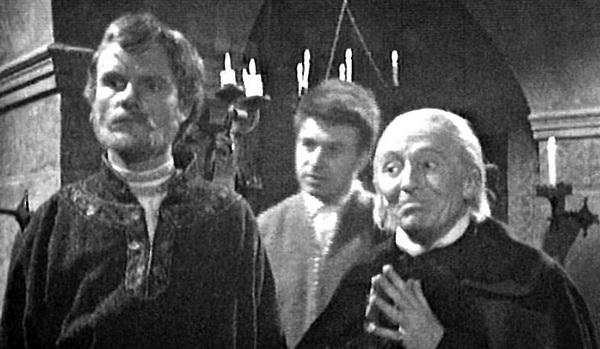



You have to love the diversity
of Doctor Who’s second season. The
juxtaposition
of the high comedy of The Romans to the Shakespearean drama of
The Crusade amply demonstrates the variety of riches that the Hartnell
historicals can provide. The latter is one of my all time favourite
stories simply because it presents its story in such a dramatic and
evocative manner. You’ve got a director who is clearly enjoying his
freshman adventure, a number of outstanding actors at the top their game,
a fantastic script full of golden nuggets
of dialogue, and an educational look at a time period that I’m not
especially knowledgeable about. Coming after the inconsistently written
and directed Web Planet serial, The Crusade appears even
more of an impressive feat.
What always surprises me is how the story is presented in such an honest
and adult way. My favourite sections involve Barbara, who is kidnapped
early in the story, being brought under the control of the loathsome and
misogynistic El Akir. Haroun’s story of his return to his home to find his
family murdered and his house burnt down leaves the viewer in no doubt as
to the dangers of falling into the hands of El Akir, and so the prospect
of Barbara doing so is one of the worst fates that we can imagine. I swear
she enjoyed making Ian sick with worry!
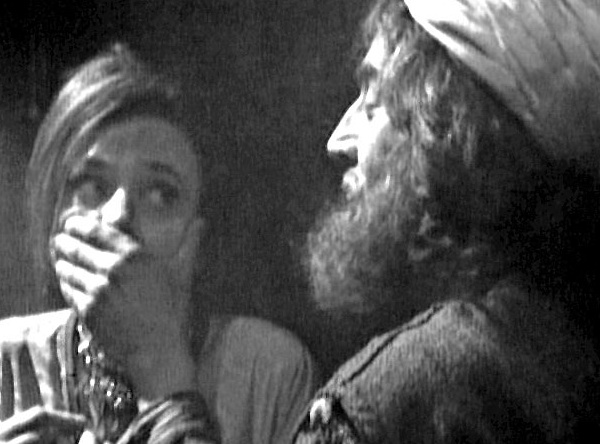
It is Barbara who gets to see both sides of this culture, sampling the
very best (a wary but delightful conversation with Saladin) and very worst
(“The only pleasure left for you is death. And death is very far away…”)
that Jaffa has to offer. The story even presents Barbara with another
dilemma that allows her to steal the show just as she did in The Aztecs
- her chase through the streets climaxes in the truly haunting image
of her holding a dagger to a terrified girl, and considering that
murdering her might be more humane than leaving her to the tender mercies
of the guards. Jacqueline Hill is just too good in these moments, and the
cliffhanger ending to The Wheel of Fortune is still one of the
series’ best.
Apparently David Whitaker’s script was so very impressive that neither
script editor Dennis Spooner nor director Douglas Camfield had to alter a
single syllable of it. The dialogue is rich throughout, and the
characterisation very sophisticated. The Saracens are presented
as being every bit as dignified as the British, yet just as capable of ill
deeds, as both sides hold one hand out in peace whilst keeping the other
firmly locked on their swords. The high drama and politics of Richard’s
court is brought to the fore in the sparkling third episode (easily the
best of the entire year) with some shockingly dramatic dialogue.
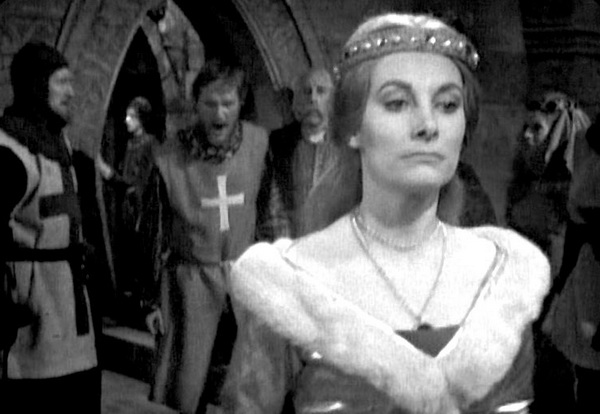
“How would you have me go to Saphadin? Bathed in oriental
perfumes, I suppose?
Suppliant, tender and affectionate?”
During the 1960s Doctor Who was sold on three things: performances,
sets and lighting, and The Crusade excels on all three fronts. The
performances are especially impressive, the serial boasting turns that
were rarely bettered during the decade. The impressive cast
list sees Julian Glover, Jean Marsh and Bernard Kay joining the regular
arsenal of talent. Glover was the big draw and brings real gravity to his
role of King Richard, never afraid
to steal the limelight from Hartnell (and not many can say that). Marsh,
meanwhile, brings
a sparkle to Joanna that transcends all the usual Princess schlock, even
baring her teeth
in that spectacular outburst in The Wheel of Fortune. Their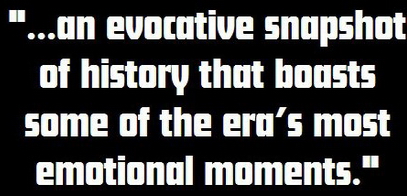 chemistry is keenly felt (and felt
a little too keenly by Hartnell, I
understand, who stamped on
the hints of incest) and between
them they bring to life a vibrant
political game. I held my breath
when Richard raised his hand
to strike his sister. For his part,
Kay’s silky-voiced and weary
Saladin is a triumph of subtlety.
It’s absolutely amazing to think
that underneath it is the same
man who played downtrodden freedom fighter Tyler in The Dalek Invasion
of Earth. The sequence that sees him silently observing his brother’s
actions behind the silk curtain is bewitching, yet he barely moves his
head. Brilliant.
chemistry is keenly felt (and felt
a little too keenly by Hartnell, I
understand, who stamped on
the hints of incest) and between
them they bring to life a vibrant
political game. I held my breath
when Richard raised his hand
to strike his sister. For his part,
Kay’s silky-voiced and weary
Saladin is a triumph of subtlety.
It’s absolutely amazing to think
that underneath it is the same
man who played downtrodden freedom fighter Tyler in The Dalek Invasion
of Earth. The sequence that sees him silently observing his brother’s
actions behind the silk curtain is bewitching, yet he barely moves his
head. Brilliant.
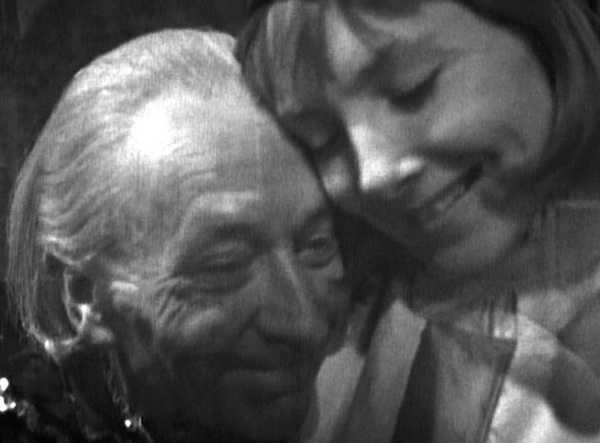
The regulars easily hold their own, however. As well as Jacqueline Hill,
whom I’ve already mentioned, William Hartnell are Maureen O’Brien both
acquit themselves admirably. I really enjoy O’Brien’s performances - she
is so much cheekier and sweeter than Susan – and this story affords us an
intimate peek at her relationship with the grandfatherly Doctor. Better
still is Hartnell’s
magnificent turn - can you imagine a more commanding moment than when he
stands up to Leicester in court and declares: “I hate fools!” He looks
majestic in his cloak, and when inveigling himself into courtly politics
he can be as theatrical as he likes (and he does like). The Doctor’s
outrage at Leicester’s behaviour allows Hartnell to bark with real relish.
Thanks to lovely directional touches such as the pan backwards to reveal
Saladin lurking in the shadows, and delightful characters as Ben Daheer
and the Chamberlain, it isn’t until the story ends that you realise it
doesn’t actually have a plot. It has been commented before that the
regulars are basically dropped into someone else’s story, meet some people
and then leave. That may not be too harsh an assessment, but it’s
important to remember that The Crusade isn’t supposed to be about
plot mechanics, but experiencing the culture of the time of the Crusades.
We get to meet Kings and traders, Sultans and bandits; it’s an evocative
snapshot of history that boasts some of the era’s most emotional moments.
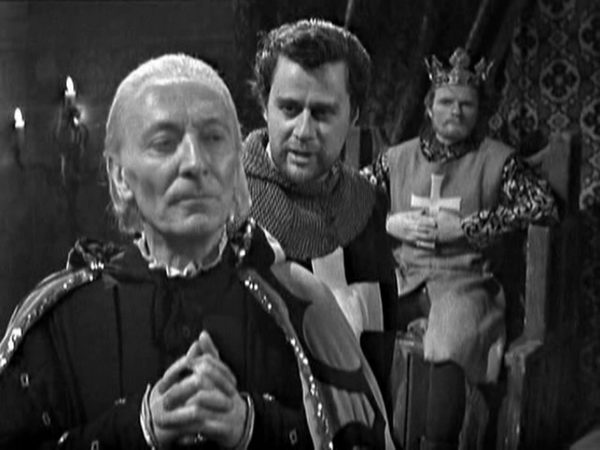
“I hate fools!”
Sadly though, The Crusade is the only story in Season 2 to have any
episodes missing from it, exemplifying the law of sod. This serial
comprises four lovely episodes of accomplished character drama and is in
my view the clear highlight of the second season, yet half of it is
missing! I often surprise myself at how angry I get when I have to resort
to listening to audio soundtracks when I should be able to watch the
production in its entirely. You really have to wonder about a universe
that junks The Massacre and The Evil of the Daleks, but
allows The Dominators and The Space Pirates to survive…

|